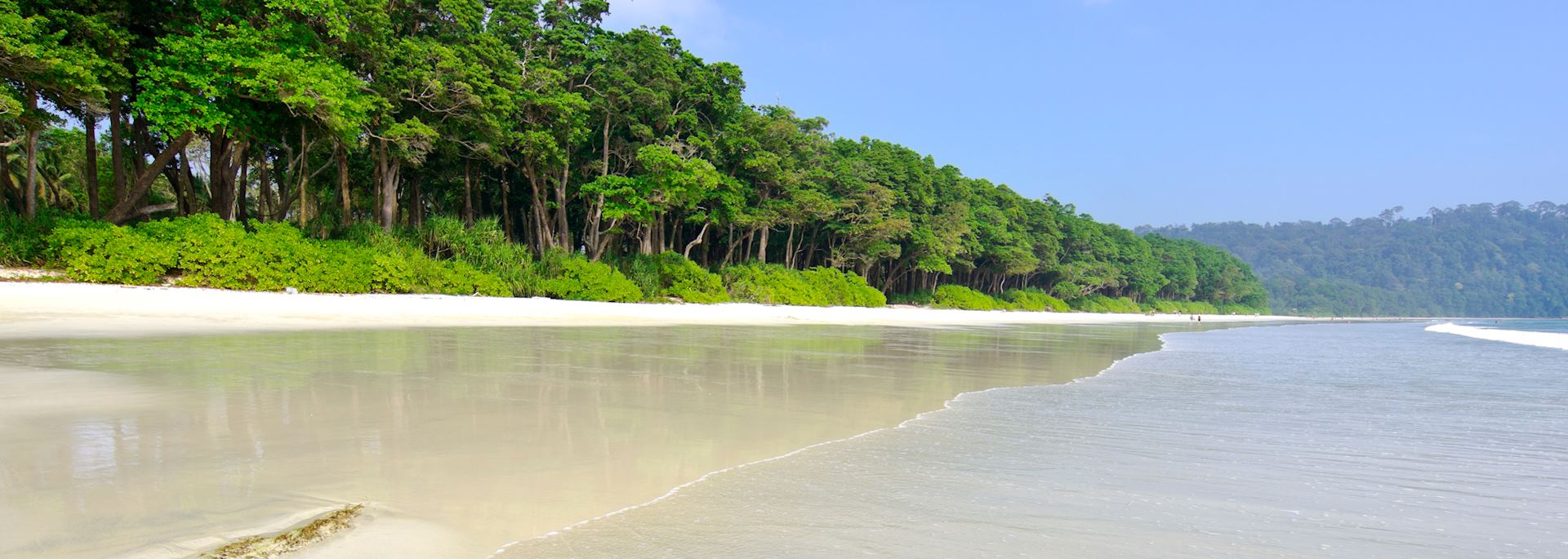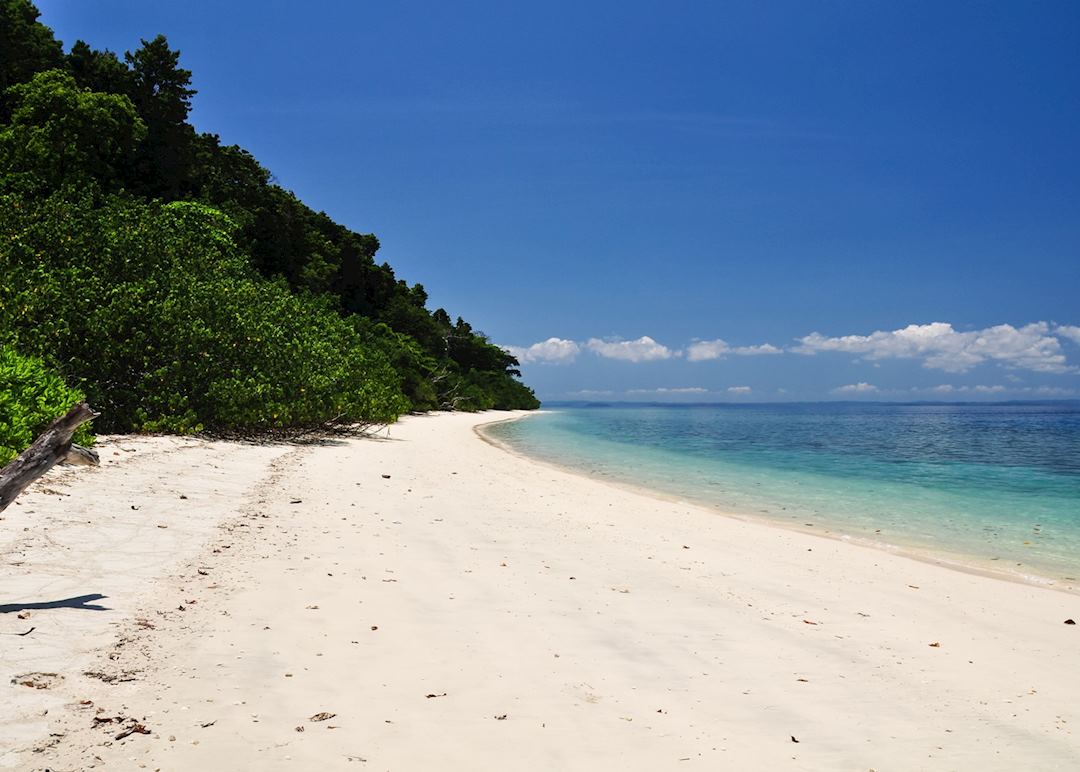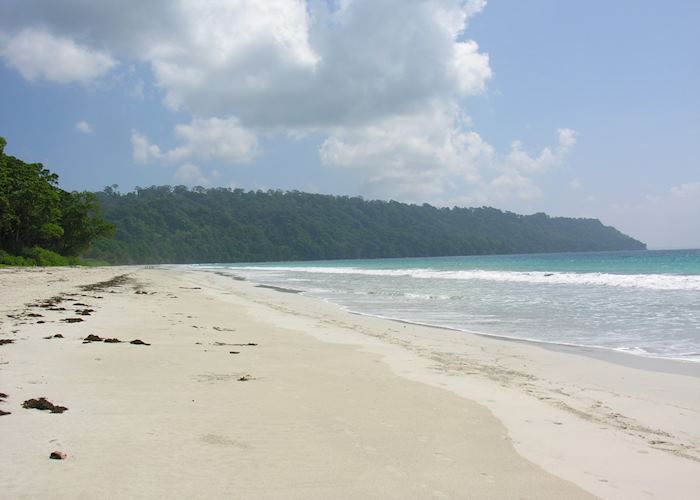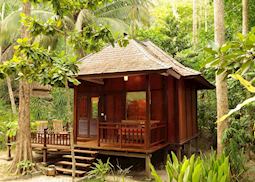Jump to:
Only a dozen of the 300 plus islands that make up the Andaman Islands are open to visitors. The rest are strictly off-limits to protect indigenous tribes, some of whom have had little or no contact with the modern world. Some 1,370 km (852 miles) from mainland India, the archipelago is closer to Indonesia, sporting azure waters and fine sandy beaches usually associated with Southeast Asia.
You’ll need to invest a little time in getting here — flying to mainland India for a night before catching a domestic flight to Port Blair, the islands’ administrative capital. After a night here you can catch a boat to your chosen hotel. As one of the few who bother to make the journey to these far-flung islands, you’ll be rewarded with miles of empty beaches and untouched primeval jungle.
India specialist JamesThe Andaman Islands may take a while to get to, but it’s worth the effort. The laid-back pace of the islands allows time to relax completely, wander the secluded beaches and snorkel.
Things to see and do on the Andaman Islands
Get away from it all on Havelock Island
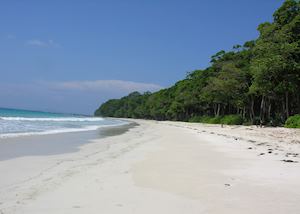 Arrive at Barefoot Resort on Havelock Island and you’ll be asked to remove your shoes before entering reception. Focused on providing a relaxing retreat, there’s no Wi-Fi, phone signal or sign of a TV here.
Arrive at Barefoot Resort on Havelock Island and you’ll be asked to remove your shoes before entering reception. Focused on providing a relaxing retreat, there’s no Wi-Fi, phone signal or sign of a TV here.
Twenty-five tents, cottages and villas are set within the deciduous forest that runs alongside a stretch of undeveloped beach. The wood to build each villa was sourced from plantations in Indonesia to avoid harvesting the native tropical forest.
Each villa and cottage has a private courtyard facing the forest, set far enough apart to feel completely secluded. It’s a comfortable, rustic stay with your rooms kitted out in bamboo furniture and weaved palm leaves covering the walls.
Diving in the Andaman Islands
Many visitors travel to the Andaman Islands for the diving alone. The waters have never been heavily fished, leaving the marine life to flourish. Dive schools on Havelock Island provide full PADI courses, as well as leisure dives for more experienced divers. There are enough dive sites to keep the most experienced diver busy for weeks, including a 55 m (180 ft) wall of coral and the SS Inchket, a wrecked cargo vessel.
There are healthy coral gardens spread along the archipelago, providing fertile breeding grounds for manta rays, turtles and speckled grouper. Nudibranchs (psychedelic sea slugs) and shrimps scuttle along the sea floor. Time your dive well and you might spot a dugong, the Andaman and Nicobar Islands' state animal.
Take a nature walk through primeval jungle
More than 200 tree species have been recorded on the islands, spread across deciduous forest, mangroves and primeval jungle. On Havelock Island, walking trails and paths criss-cross between the trees, leading from the beaches to the dense interior greenery.
You can take a short walk from your hotel or arrange for a guide to take you deeper inland. Bearded pigs and geckos are a common sight, and you might also spot serpent eagles and the occasional woodpecker.
Sea kayak to explore the Andaman Islands
With few roads on the islands, the best way to explore is from the sea. Accompanied by a guide, you can paddle through the calm waters of the mangroves or ride the waves of the open ocean.
From the seat of a kayak it’s possible to see parts of the coast that are closed off to visitors, preserving their natural beauty. The jungle often reaches right up to the sea, which means you might sight the occasional hornbill — although you’ll usually hear it first.
Best time to visit the Andaman Islands
Visit from December to April and you can enjoy clear skies and temperatures averaging 30°C (86°F). In May and June, the weather gets quite hot and humid. July through to September is best avoided due to heavy rain (many hotels close at this time). If you’re happy with a few showers, October to November is a great-value time to travel.
Festivals, events and seasonal reasons to visit
- For the best possible diving experience, visit in February and March when the waters are at their clearest and calmest.
- As it’s difficult to experience a festival on the Andaman Islands, it’s worth considering extending your trip to mainland India. Holi, celebrated in March, announces the arrival of spring with the throwing of vibrant powder, while Diwali, the festival of light, occurs in November.
who's been there

Start planning your tailor-made trip to Andaman & Nicobar Islands by contacting one of our India specialists
-
617-223-4521617-223-4195
- Make an inquiry
Photos of Andaman & Nicobar Islands
Accommodation choices for Andaman & Nicobar Islands
We've selected a range of accommodation options for when you visit Andaman & Nicobar Islands. Our choices usually come recommended for their character, facilities and service or location. Our specialists always aim to suggest properties that match your preferences.
-
![Andaman Villa, Barefoot Resort]()
Barefoot Resort, Havelock Island
Andaman & Nicobar Islands
